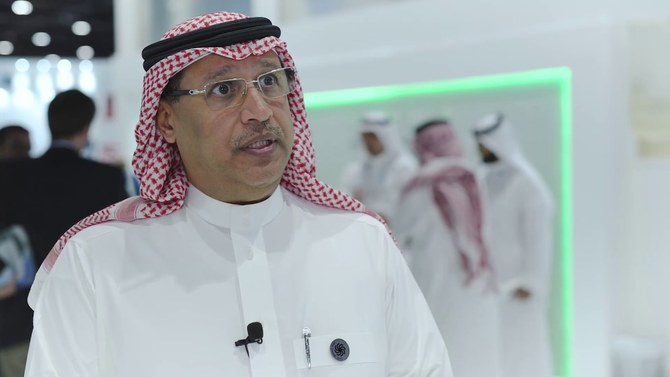
- ARAB NEWS
- 29 Apr 2024

RIYADH: Saudi Energy Ministry has upped its ante in its fight against climate change to meet its environmental commitments, said a senior government official on Sunday at the Middle East and North Africa Climate Week 2023.
Speaking to Arab News, Khalid Abuleif, the Energy Ministry’s sustainability adviser, said the sector is aligning its policies with the global environmental objectives, particularly the Paris Agreement.
“The ministry is actively implementing measures to enhance energy efficiency, promote the use of renewable energy sources and decrease the carbon intensity of the energy sector,” said Abuleif.
He added that these efforts are consistent with Saudi Arabia’s commitment to achieve the objectives of the Paris Agreement and net-zero emissions in the Kingdom by 2060.
Abulief, who also serves as the climate change chief negotiator for the ministry, added: “Saudi Arabia has set ambitious targets for reducing GHG (greenhouse gas) emissions and increasing the share of renewable energy in its energy portfolio.”
He affirmed that the Kingdom is fully engaged in achieving and accelerating clean technologies for reducing emissions from hydrocarbon utilization through abatement and removals.
Abuleif emphasized that the energy sector ensures clean and efficient fuel production and prioritizes investing in innovative climate solutions.
He said innovations such as “mobile carbon capture technologies, prototype solar cells that currently have the world’s highest certified power conversion efficiency, underground carbon locking” are leading the energy transition.
The Energy Ministry is also working diligently to create a favorable regulatory environment encouraging investment in renewable energy and reducing carbon emissions.
It has collaborated with businesses, research institutions and NGOs to achieve a more sustainable future.
Abuleif also highlighted the sector’s position in integrating long-lasting energy solutions into urban planning and transportation systems.
“Our role is to create a favorable regulatory environment that supports sustainable infrastructure development and projects by both government and non-government entities in Saudi Arabia,” said Abulief.
The ministry is also engaged in various strategies to mitigate climate change by developing prudent management of land, ocean, food and water resources.
“Saudi Arabia has conducted the world’s largest coral reef survey using high-resolution mapping. Our findings will inform preservation and environmental management approaches around the world,” said the ministry official.
Private sector engagement is a core principle of Saudi Arabia’s climate action approach. Abuleif outlined how they have strived to implement policies and incentives to motivate this area’s investment in clean energy technologies.
“One example of private sector collaboration is the partnership between Aramco and Air Products to establish Saudi Arabia’s first hydrogen filling station in Dhahran’s Techno Valley,” he stated.
As the host of MENA Climate Week 2023, Saudi Arabia aims to advance regional climate solutions through knowledge sharing, partnerships and inclusive environment action commitments.
Regarding regulatory frameworks and policies, Abuleif noted that the Kingdom is implementing feed-in tariffs to incentivize renewable energy generation. These ambitious targets are also set to accelerate the transition to a low-carbon economy.
As the world approaches the UN climate change conference in the UAE next November, the Saudi Energy Ministry expects the world to join hands in their commitment to saving the planet.
“Our message for COP28 is clear: Collective efforts are paramount. Climate change is a global challenge that transcends borders, and it demands a global response that takes into account historical emissions and national circumstances of different countries,” said Abuleif.
He added: “Every nation, regardless of its size or resources, has a role to play in mitigating the impacts of climate change. We believe in the power of international cooperation, inclusivity, circularity, knowledge exchange and collaborative problem-solving to drive meaningful progress.”
Abuleif underscored Saudi Arabia’s recognition of the critical importance of global collaboration in addressing the urgency of the current environmental crisis.
He noted: “When it comes to climate response, one size doesn’t fit all. Each region should be encouraged to meet its climate goals in ways that may not be applicable elsewhere. Investment in innovation and technology must be inclusive since it holds the key to the sustainable future we are all committed to.”